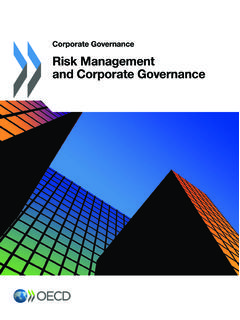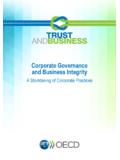Transcription of Improving Governance Performance Rules-Based vs ...
1 LEADERSHIP ACUMEN Issue 16. Doug Macnamara & Banff Executive Leadership Inc. Improving Governance Performance Rules-Based vs. Principles-Based Approaches There is a debate raging in the Governance world these days about how to improve the level of Trust in our communities regarding the Governance bodies of companies, charitable corporations, Aboriginal communities, professional associations, and more. While many debates are underway, the highest profile ones are playing out in the various global securities communities, with other organizations taking their lead from there. To some Board members, these debates might seem quite detached from our day-to-day Governance responsibilities. However;. understanding the different positions in this debate, and the underlying rationales should help your Board better develop policies and practices to improve your Governance transparency and enhance community trust in your organization's leadership.
2 First and Foremost, This is About Restoring Trust A fall-out from the continued litany of transgressions of our senior community leaders exposed in the media, is the overall deterioration in trust by the average citizen towards those in the privileged position of power, influence, and community responsibility. Consider the media reports we have seen in the past months: Lord Conrad Black's irregular payment of bonuses to himself and key executives;. Canadian Bernie Ebbers actions of WorldCom notoriety;. Former Minister of Public Works Alfonso Gagliano's kick-back scandal;. Chiefs and Councils embezzlement and/or leadership into bankruptcy of Aboriginal communities;. David Peterson's infamous insistence that he was unaware of money laundering for the Russian mob by YBM Magnex International - a company that he served as a Director of the Board;. Crown Corporation Hydro One and their Board's support for CEO Eleanor Clitheroe's huge perks package and questionable corporate /personal expenses.
3 Canadian Priests of the Catholic Church exposed for alleged child molestation;. Illegal fundraising or receipting practices by a few registered charities;. Concern over trading practices/abuses in Canadian Mutual Fund companies. As each one of these revelations slams into the public's conscience, the trust in Governors and Governance takes another hit'. And still, we encounter more conflicts of interest issues at the Governance level, as an almost every- day occurrence. So, how do those of us who are trustworthy, honourable, and of good character restore this lost trust, so we can get on with the already difficult task of governing? Well, some feel we must stake-out new rules or principles for ourselves and our colleagues to follow. We try to ensure that members of our Governance community follow guidelines , and we seek to make acceptable practices public in order to publicly hold ourselves accountable to these higher standards.
4 Leadership Acumen 16 Governance Principles vs. Rules Page 1 of 5. Rules vs. Principles A Difference in Faith In pursuing the best way to restore the lost trust, various bodies look to different means to ensure improved behaviour. In the global securities marketplace, restoring faith in Governance by investors has become a time-sensitive, crucial initiative to ensure capital still flows into the trading arena; that stock prices are buttressed; and that investors will be able to accurately assess the value and potential of companies and/or funds. A quick look at the various jurisdictions shows how the faith in our colleagues differs. In the USA, the Sarbanes-Oxley Act was introduced into legislation by The House of Representatives and then the Senate who were concerned about the fact that CEO's, CFO's and Boards must be expressly accountable for the Financial Statements and Management Estimates published by their companies.
5 This act is a specific Rules-Based approach and a requirement by all corporations operating in the USA. It confers special responsibility and expectations on Public Accounting Firms and Auditors, the Securities Exchange Commission, and State Legislatures to police the Act. Recently the US Securities and Exchange Commission (SEC) approved new Governance rules outlined by the NYSE and NASDAQ, for companies listed on their exchanges. Those who fail to comply by November 2004, risk being de-listed. In Canada, the TSE refused to enunciate hard and fast rules, preferring instead to outline guidelines , then rely on shareholders to hold their Boards accountable for operating in relation to the guidelines . As of January 16, 2004 the Ontario Securities Commission published its proposals for best practices in Governance , and requiring all Issuers to make regular disclosure about their practices against such best practices.
6 The OSC has thus moved towards a quasi-rules based environment. In the UK, the Cadbury Commission of the London Stock Exchange released their Combined code of Governance Principles and Best Practices. The suggestion being that companies self-report to the investment community against these standards as their approach to restoring trust in their market. The Hong Kong Laws regarding good Governance were published as a code of Best Practices . These explicitly state that they are not intended as rules to be rigidly adhered to, but should rather serve as guidelines that companies should aim for. The German Panel on corporate Governance essentially embraced the OECD's Principles of Governance and recommended transparency approaches to information and disclosure practices by German listed companies. CalPERS, the huge California Public Employees Pension Fund investor established Principles of Governance , which they presumably use to help decide whether or not they will invest in a particular company or Fund.
7 Outside the specific corporate Governance realm, there are a multitude of recommendations but few hard and fast Rules-Based applications. In Canada, the Canada Revenue and Customs Agency (CRCA) sets rules that outlines the minimum expectations and practices for which Charitable Organizations' Boards must comply in order to retain their Charitable status. The report: Building on Strength: Improving Governance and Accountability in Canada's Voluntary Sector. (Also known as the Broadbent Report ) established a set of best practices and recommendations for Canada's Charitable and Not-for-Profit community in 1999, and in 2009 Bill C-4 the new Not For Profit Corporations Act was passed with clear rules and expectations for NFP Boards. In a much broader context, the OECD has developed corporate Governance guidelines that are non- binding Principles that reflect the views of member countries.
8 The OECD also publishes Governance guidelines for government bodies and NGO's. Many countries have specific laws against embezzlement and/or tax evasion which usually are the basis for police action against crooked politicians, businesses and individuals. The World Bank and International Monetary Fund create specific rules requiring transparency and democratic processes for countries/governments looking to receive their funds. Leadership Acumen 16 Governance Principles vs. Rules Page 2 of 5. Transparency International has garnered many signatures of countries that commit their companies, government institutions and individuals to the avoidance of bribes, kick-backs, etc. Those who break the rules, even outside their country are liable for prosecution and penalty in their home country. As you can see, most jurisdictions around the world favour the use of Principles and guidelines and extend a belief and trust in their organizations to subscribe to such principles.
9 Such faith also leaves the vigilance of good practice to the larger community, and leaves unclear the specific consequences however one assumes that public exposure of practices not in keeping with the principles will result in significant loss of face and credibility. In America, there is a tendency not to extend such trust, and instead to develop and insist on compliance to a specific set of rules. In such a system the consequences of non-compliance are clear, and supposedly swift, yet restricted to the jurisdiction of the regulatory body. The Value and Challenges of a Rules-Based Approach Playing by the rules requires all members of a community to exhibit minimum standards of practice. In order to gain approval by a majority of members, the standards have to be essentially the minimally acceptable practices. This can result in less-than-excellent standards.
10 Take for example the Honk Kong Laws and Regulations on Governance . They stipulate an expectation that the Board of Directors holds a meeting twice per year. While this may well be appropriate for a small corporation (still questionable if it is a publicly listed corporation), it is clearly an inappropriate standard for a larger corporation. The recent NYSE and NASDAQ rules define an Independent Director as someone who has received less than $100,000 of employment income from the company on an annual basis. Hmmm, in the heady levels of executive compensation in the USA, this may seem like a paltry sum;. however, I would suggest many average citizens would see someone earning $95,000 a year from a company, as someone who has a significant, vested interest in the organization. With these exceptions set aside, rules such as those in the Sarbanes-Oxley Act have significantly improved corporate Governance and executive staff reporting to the Board.


